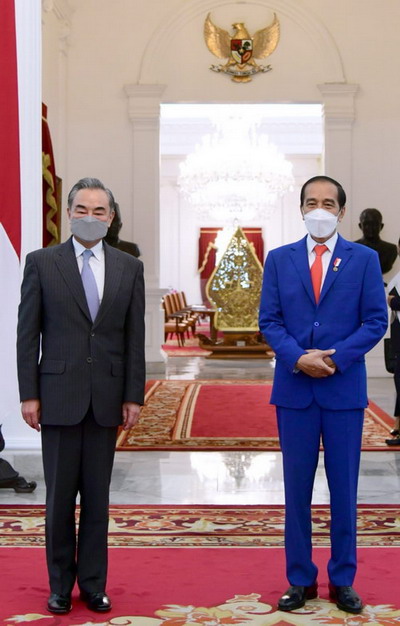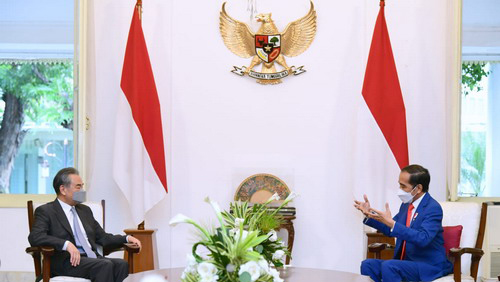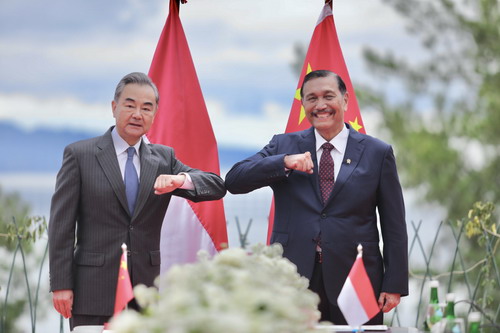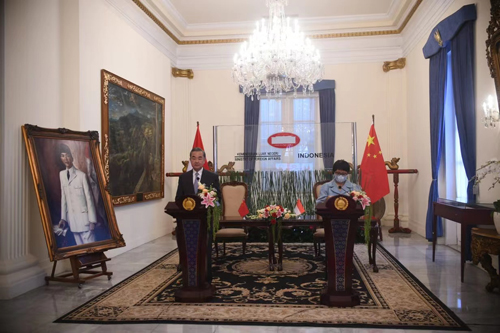
Chinese State Councilor and Foreign Minister Wang Yi (L) meets with Indonesian President Joko Widodo in Jakarta, Indonesia, January 13, 2021. /China's Foreign Ministry
Chinese State Councilor and Foreign Minister Wang Yi (L) meets with Indonesian President Joko Widodo in Jakarta, Indonesia, January 13, 2021. /China's Foreign Ministry
China is willing to collaborate with Indonesia in anti-pandemic and development efforts to advance bilateral relations in the post-pandemic period, Chinese State Councilor and Foreign Minister Wang Yi said on Wednesday as he met with Indonesian President Joko Widodo.
During his visit to the country, Wang first sent condolences to the president over the recent Sriwijaya Air crash.
On bilateral ties, Wang said that the cooperation between China and Indonesia, both as major developing countries and emerging economies, has made significant progress. It has shown strong resilience and great potential in the face of the pandemic.
The Indonesian president hailed the cooperation between the two sides, especially in the health sector, and expressed the hope that the two countries can continue to deepen cooperation in areas including trade, investment, finance and culture.
Read More: Indonesian President Widodo receives Chinese COVID-19 vaccine
The Chinese foreign minister said that the two countries have successfully carried out the phase 3 clinical trials and the emergency use of its coronavirus vaccine, setting a model for vaccine cooperation between regional countries and developing countries.
Wang stressed that cooperation is the most powerful weapon to fight the pandemic. Despite the increasing domestic need for COVID-19 vaccines, Wang added, China is willing to facilitate the production and purchases of vaccines between the two countries' enterprises to help promote availability and affordability of vaccines in developing countries.
He also said that China is willing to promote high-quality Belt and Road cooperation with Indonesia, and strengthen cooperation on technological innovation.
The Chinese foreign minister also met with his Indonesian counterpart Retno Marsudi and held a joint press conference on Wednesday.
00:55

Earlier on Tuesday, Wang met with the Indonesian government's Coordinator for Cooperation with China Luhut Binsar Pandjaitan, and discussed strengthening medical and health cooperation as well as maritime cooperation between the two countries.
Wang said that he hoped the two sides can sign cooperation documents on the Belt and Road Initiative and Global Maritime Fulcrum at an early date and called for more efforts to promote big projects, such as the Jakarta-Bandung high-speed railway and the Regional Comprehensive Economic Corridor.
To inject strong impetus into the economic development of the two countries, Wang stressed cooperation in tourism, agriculture, vocational education and training, and digital economy.

Chinese State Councilor and Foreign Minister Wang Yi (L) meets with Indonesian government's Coordinator for Cooperation with China Luhut Binsar Pandjaitan in North Sumatra, Indonesia, January 12, 2021. /Chinese Foreign Ministry
Chinese State Councilor and Foreign Minister Wang Yi (L) meets with Indonesian government's Coordinator for Cooperation with China Luhut Binsar Pandjaitan in North Sumatra, Indonesia, January 12, 2021. /Chinese Foreign Ministry
China is willing to import more products from Indonesia and is positive about expanding the scale of bilateral currency swap, Wang added.
In terms of maritime cooperation, he stressed joint efforts in navigation safety, marine scientific research, maritime search and rescue, disaster prevention and mitigation, and environmental protection.
For his part, Luhut said that Indonesia is willing to work with China in these areas and welcomes China to expand investment in his country, adding that Indonesia is looking forward to Chinese electric vehicle companies coming to the country.
He also expressed hope that the two sides would launch a working group on bilateral trade as soon as possible, hold a meeting of the Maritime Cooperation Committee, promote the export of agricultural and fishery products to China, and deepen cooperation in the financial sector.

Chinese State Councilor and Foreign Minister Wang Yi (L) at a joint press conference with Indonesian Foreign Minister Retno Marsudi in Jakarta, Indonesia, January 13, 2021. /China's Foreign Ministry
Chinese State Councilor and Foreign Minister Wang Yi (L) at a joint press conference with Indonesian Foreign Minister Retno Marsudi in Jakarta, Indonesia, January 13, 2021. /China's Foreign Ministry
Prior to the talks, the two sides witnessed the signing of two memorandums of understanding on development of cybersecurity capacity building and technical cooperation, and regional economic and trade cooperation.
At a joint press conference with Indonesian Foreign Minister Retno Marsudi on Wednesday, Wang said that China and Indonesia reached a five-point consensus in areas such as cooperation against the COVID-19 pandemic, promoting bilateral trade, regional cooperation and development, maintaining peace and stability in the South China Sea, and safeguarding multilateralism.
Stressing the importance of multilateralism, Wang said that the idea should be earnestly upheld, the principles of multilateralism should be maintained, and various kinds of pseudo-multilateralism should be resisted.
The Chinese state councilor said that genuine multilateralism means adherence to the purposes and principles of the UN Charter and the basic norms governing international relations, and it also requires respect for the sovereignty of all countries as well as the equality of all countries, large or small.
China is against the closed-group politics in the name of multilateralism, opposes imposing rules made by a handful of countries to the international community, and resists using multilateralism as a tool to forge values-based alliances targeting specific countries, he said.

